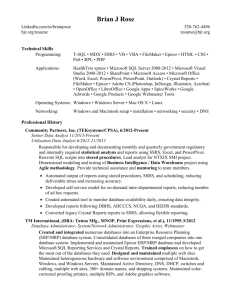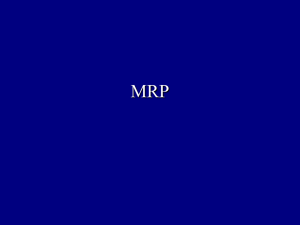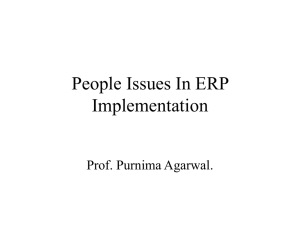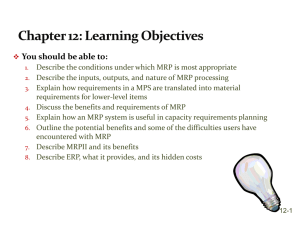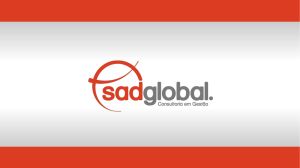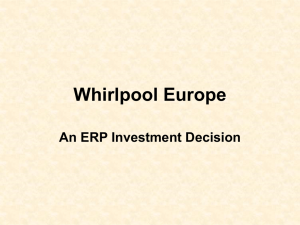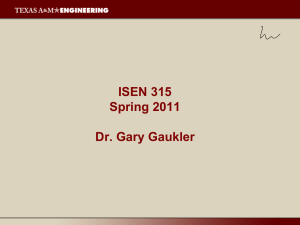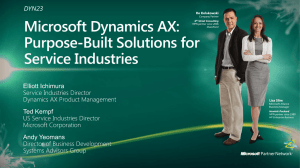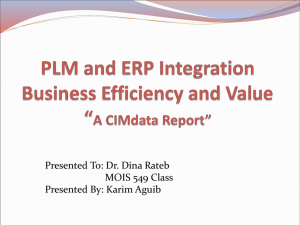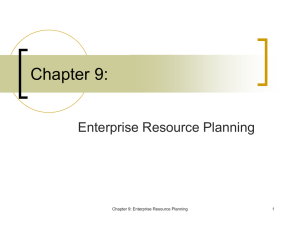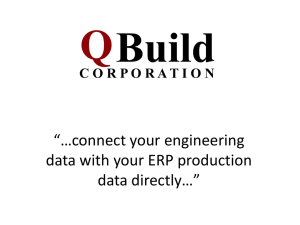File - Management Information System
advertisement
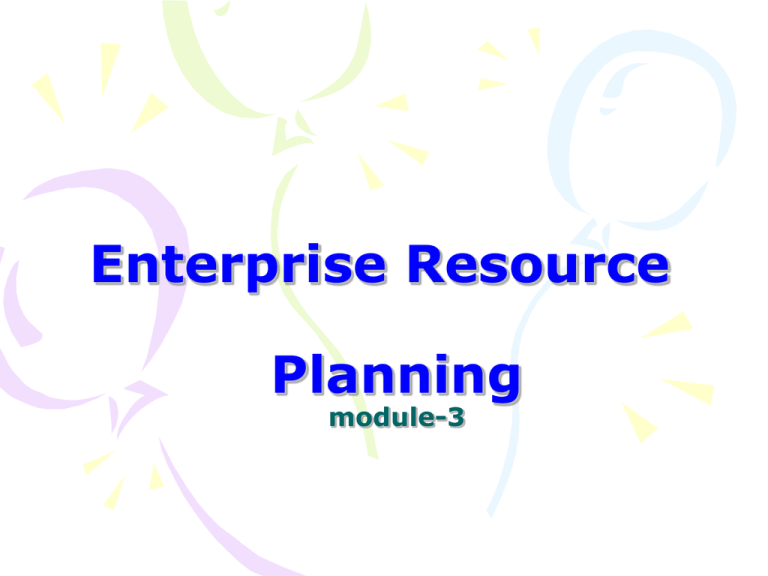
Enterprise Resource Planning module-3 ERP- A curtain Raiser • The business has changed more in past five years than it did over the previous five decades • The ability to respond to new customer needs and seize market opportunities as they arise is crucial. • Enterprises are continuously striving to improve in the areas of quality, time to market, customer satisfaction, performance and profitability. What is an Enterprise? • An Enterprise is a group of people with a common goal, which has certain recourses at its disposal to achieve the goal. • In traditional approach, the enterprise is divided into different units based on the functions they perform. • Each of these depts. have their own goals and objectives. • For any organization to succeed , all business units or depts. should work towards this common goal • Each departments will have its own goals and objective and some time be conflicting. (Finance Vs Marketing on the basis of Advertisement) • The result is that instead of taking the organization towards the common goal, the various department end up pulling it in different directions. • This is because one dept does not know what the other does. • To manage this problem, the only solution is to get to know about what happens in the other departments • To make this possible for the companies to execute this vision, there is a need for an infrastructure that provide information across all functions and locations within the organization. • ERP software fulfils this need • In ERP, the functional departments are integrated by providing the information that is stored centrally in it. What is ERP? • An Enterprise is a group of people with a common goal, which has a certain resources at its disposal to achieve that goal • Resources include are money, man power, materials and all other things that required to run the enterprise. • Planning is done to ensure that nothing goes wrong • Thus ERP covers the techniques and concepts employed for integrated management of businesses as a whole, for the effective use of management resources, to improve the efficiency of an enterprise • ERP software is designed to model and automate many of the basic processes of a company, with a goal of integrating information across the company • In other words ERP is complete solution for all the operational problems of the company • Introduction of the ERP system to the company dramatically changes the overall efficiency of organization in its levels of activities. Integration of different ISs in ERP Before ERP • Multiple systems, different interfaces, difficult to extract info about customers, sales,... • Hard to maintain, many languages, databases, inconsistencies • Can take weeks or months to obtain info about customers, or where systems changes are needed After ERP • • • • • • Integrated systems Consistent interface One database Access to current data Improved planning capabilities Multinational capabilities Consider a practical example…. • Consider a Customer order • A data entry operator enters the data to the system… • With the implementation of good ERP system, the order entry clerk becomes an action initiator. • As soon as he enters the order into the system, the information is passed on toe the sales, distribution and finance module…. And so on… • All these actions take place automatically and fulfils the customer order at the earliest. Reasons for the growth of ERP market • To enable improved business performance • Cycle time reduction • Increased business agility (the ability to think and draw conclusions quickly & intellectually) • Inventory reduction • Order fulfillment • To provide flexible, integrated, real-time decision support • Improve responsiveness across the organization. • To support business growth requirements • New products, new customers • To have competitive advantage • Increased functionality at a reasonable cost • Client-server, open technology Advantages of ERP • ERP has many advantages- direct and indirect • Direct……… • • • • Business Integration Flexibility Better analysis and planning capabilities Use of latest technology • Indirect……… • Better corporate image • Improved customer goodwill • Improved customer satisfaction Why are ERP packages being used now? • Main Reasons are • ERP handles the entire range of business functions necessary for the company’s operations • Highly flexible for a long term prosperity of the company • Global adaptation by ERP packages’ multi-lingual, multicurrency capability. Helps the organization to grow globally • Helps in reduction of organization’s operating costs • Integrates all parts of an organization • Increases the efficiency of operations as a result of this integration • Integration of information systems which enables seamless flow of information across the organization. • Enables consolidation of different software in the organization • Helps in better customer service Top 5 ERP vendors and their products Vendors Product SAP AG R/3 Oracle Corporation Oracle Applns J D Edwards World Solns Co. One World People Soft inc. People soft Baan co. BaanIV ERP Evolution ERP Evolution ERP evolution contd….. • In the 1960’s inventory control assumed prime importance and most of the software at that time were designed to help in inventory management. Typically, these were handled by tools called BOM processors (Bill of materials) • The focus shifted in the 1970’s to Material Requirement planning (MRP) as the complexity of manufacturing operations increased. • The MRP system integrates the inventory control with finance and HR departments • Then in the 1980's the concept of Manufacturing Resources planning (MRP-II), which was nothing but extension of MRP which integrates all the functional units of the manufacturing industry. • In the early 1990’s, increased complexity of businesses and the need to integrate all the functions within an enterprise to sustain in the dynamic environment lead to development of ERP (Enterprise Resource planning) tool. ERP was extension of MRP II to cover the range of activities within any enterprise Bill Of Materials (BOM) • BOM defines the relationship of components to end items. • BOM identifies all components used in the production of an end item. • BOM also called the Product Structure Diagram • Eg--- consider a chair. A chair is composed of many components like seat, leg assembly, back assembly etc.. As in the figure below • The key to MRP is time-phasing of requirements for components in the BOM structure • If we know the time required to manufacture or purchase components, we can determine when orders should be released to the shop floor or to the external suppliers BOM of a Chair Level 0 1 Chair Leg Assembly 2 Legs (2) 3 Cross bar Seat Back Assembly Side Cross Back Rails (2) bar Supports(3) Materials Requirement Planning What is MRP? * Computerized Inventory Control * Production Planning System * Manufacturing Control System Deals with …… what material needed? when & how purchased? how managed? maximize efficiency of physical, financial assets. MRP is a….. • Computerized Inventory Control • Production Planning System that….. • Schedules Component Items as Needed which will….. • Track Inventory and….. • Help you in many other aspects of business Overview of the MRP System Product Structure File Master Production Schedule Inventory Master File Material Requirements Planning Manufacturing Orders Purchase Orders Various Reports MRP Inputs • Product Structure File (e.g.– BOM) • Master Production Schedule • Inventory Master File Master Production Schedule • Schedule of Finished Products • Represents Production, not Demand • Combination of Customer Orders and Demand Forecasts • What Needs to be Produced Inventory Master File • • • • • • On-Hand Quantities On-Order Quantities Lot Sizes Safety Stock Lead Time Past-Usage Figures MRP Outputs • Manufacturing Orders • Purchasing Orders • Various Reports Advantages of MRP • Reduce Inventory Levels • Reduce Component Shortages • Improve Shipping Performance • Improve Customer Service Improve Productivity • Simplified and Accurate Scheduling • Improve Communication • Improve Plant Efficiency • Reduce Freight Cost • Reduction in Excess Inventory • Reduce Purchasing Cost • Improve Production Schedules • Reduce Manufacturing Cost • Reduce Lead Times • Less Scrap and Rework • Higher Production Quality • Reduce Overtime • Improve Supply Schedules • Improve Calculation of Material Requirements • Improve Competitive Position Summary of MRP MRP is a….. • Computerized Inventory Control • Production Planning System that….. • Schedules Component Items as Needed which will….. • Track Inventory and….. • Help you in many other aspects of business Closed Loop MRP • For an MRP system to be useful, the production system must be able to complete component orders in time • Closed Loop MRP uses capacity planning and feed back to improve the ability of the production system to complete the work as planned. • Timely Feedback to MRP planners allows them to develop alternatives, or at least minimize the effect of the problem. • For e.g.--- if production of a set of component may not finish on time, then decision based on this feed back can be applied to the entire production of the company Rough-cut Capacity Plans (RCCP) Manufacturing Resource Planning (MRP II) • MRP II is an extension of closed loop MRP for managing the entire manufacturing company. • MRP II systems provide information that is useful to all functional areas and encourage crossfunctional interaction. • MRP II support to link marketing, sales department with production, manufacturing departments to get to know about the product variety, availability. • Thus they get the ability to give customers accurate delivery dates. • MRP II support financial planning by converting materials schedule into capital requirements • Thus, proper information is required to successfully plan and schedule production in the company • MRP II systems increase a company’s efficiency by providing a central source of management information
